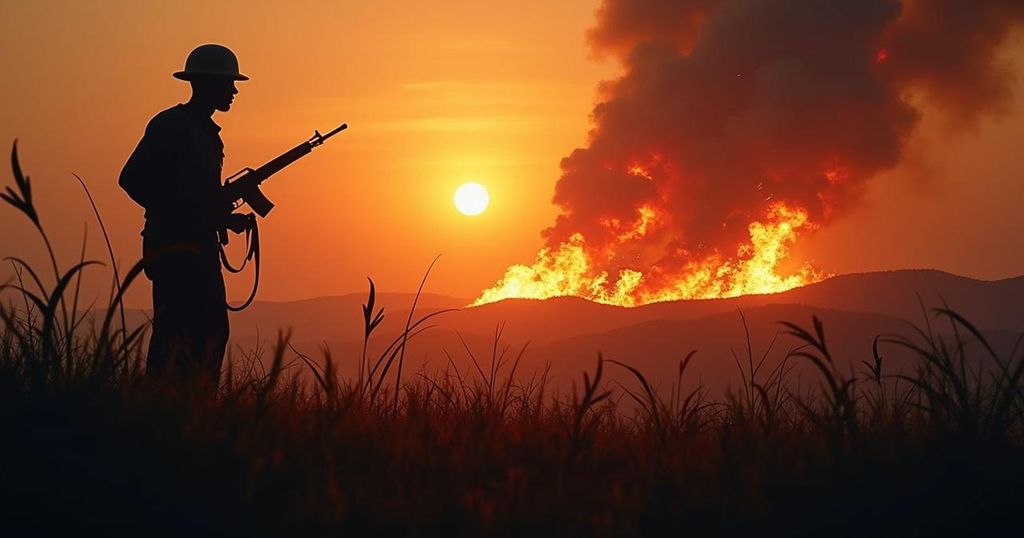Escalating Humanitarian Crisis in the Democratic Republic of the Congo Linked to Mpox and Ongoing Conflict
The Democratic Republic of the Congo is facing an unprecedented humanitarian crisis, with 25 million individuals affected due to prolonged conflict and health emergencies, including severe Mpox outbreaks. The militia activities have led to mass displacement and overwhelming food insecurity. The WHO has warned of dire health risks, especially for children, while urging for increased humanitarian funding and support. The cessation of the MONUSCO mission complicates security and health response efforts, emphasizing the need for urgent international intervention.
The Democratic Republic of the Congo (DRC) is currently engulfed in a profound humanitarian crisis, affecting at least 25 million individuals, as articulated by the World Health Organization (WHO) on Friday. This situation has escalated due to prolonged conflict in the mineral-rich eastern regions of the DRC, which has resulted in increased violence, mass displacement, public health crises, and extensive mental trauma, particularly among the vulnerable segments of society. Dr. Adelheid Marschang, a Senior Emergency Officer at the WHO, underscored that the nation bears the highest number of people requiring humanitarian assistance globally, with many in states of chronic and acute shock. The recent resurgence of the M23 militia movement has exacerbated conditions, leading to unprecedented levels of displacement, with approximately 7.4 million individuals uprooted. North Kivu has been particularly impacted, housing 2.8 million displaced individuals. As the conflict unfolds, water and sanitation infrastructures have been overwhelmed, worsening living conditions for the remaining population. Data reveals that 40% of the population, more than 40.8 million people, are experiencing serious food shortages, with 15.7 million facing severe food insecurity, placing them at a heightened risk of malnutrition and related health complications if immediate interventions are not initiated. In addition to these challenges, the DRC grapples with health crises encompassing outbreaks of cholera, measles, meningitis, and notably, Mpox—an ongoing global health concern with 26 countries reporting cases to the WHO. The DRC has recorded an alarming 20,000 Mpox cases, with over 1,000 fatalities since the beginning of 2023, and children are disproportionately affected. Dr. Marschang highlighted the imminent threat of a new strain of Mpox proliferating, particularly in the overcrowded camps around Goma, which have become hotspots for viral spread amid military disruptions hindering effective health responses. Furthermore, the humanitarian situation is critically underfunded, with only 16% of the 2024 Humanitarian Response Plan funded to date, necessitating 2.6 billion dollars to assist 8.7 million individuals. The exit of the United Nations Stabilization Mission in the DRC (MONUSCO) from South Kivu has intensified security concerns, presenting additional complexities to an already volatile situation. The cessation of MONUSCO’s operations, following a two-decade tenure, could potentially intensify rebel activities, particularly by the M23 group, which poses risks of wider regional conflict. In light of the severe human rights violations and absence of state authority, calls for urgent action to stabilize the humanitarian landscape have been emphasized by international officials.
The situation in the Democratic Republic of the Congo is steeped in decades of conflict, primarily in the eastern regions rich in resources. These hostilities have led to notable humanitarian crises characterized by violence, mass displacement, and public health emergencies. International organizations, including the WHO, have expressed grave concerns about the country’s deteriorating conditions, citing the urgent need for humanitarian support and essential health services amidst escalating violence, particularly by rebel groups such as the M23. The ongoing Mpox outbreaks highlight the interplay between military instability and public health, revealing how conflict complicates responses to disease and humanitarian assistance.
The humanitarian crisis in the Democratic Republic of the Congo is dire, with millions affected by conflict-induced displacement and health emergencies exacerbated by widespread food insecurity and disease outbreaks such as Mpox. The lack of funding and the withdrawal of international peacekeeping efforts compound these challenges, necessitating urgent attention and action from global health and humanitarian organizations. A coordinated response is essential to address both immediate health threats and the broader humanitarian needs of the population to mitigate further suffering and instability in the region.
Original Source: news.un.org




Post Comment